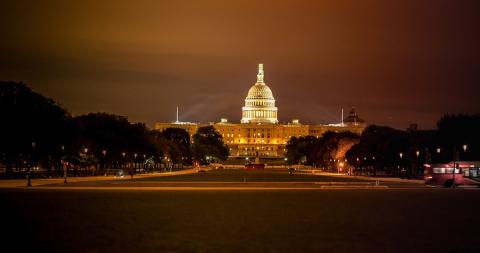Editor's Note: This piece originally appeared in the Portland Press Herald and has been republished on IVN by request and with permission from the author.
Greg Kesich’s July 25 column in the Portland Press Herald, “The View From Here: Party politics times five,” is excellent in its analysis of a worn-out theme: partisan elections. Whether two parties or five, the parties do wage a 24/7 uncivil war. But given their vital role, can’t the media help end it?
America needs a more honest election process. Too many join the partisan battles. That’s where the money is. Too many paint states as red, blue or purple. Demographically, that’s untrue. We need an election system that’s red, white and blue.
It is coming. The growth of nonpartisan elections is enormous. More than 80 percent of our largest cities now have nonpartisan elections. New York City used Maine’s ranked-choice voting in its recent election. In 2017, the Bangor Chapter of the League of Women Voters of Maine went much further. It tried to plant the “combined seeds” of a top-four primary with ranked-choice voting in Maine. Surprise! Somehow, they sprouted in Alaska which now has the most advanced state election system in the nation: top-four primaries instead of partisan primaries for governor, Legislature and Congress, and ranked-choice voting in general elections.
The Echelon Insights survey cited in the July 25 column identifies the major parties as a collection of coalitions. But what else? “Rather than looking at candidates and parties,” according to Kesich, “the pollsters asked voters a series of questions.” Is this statement accurate? Doesn’t the Echelon survey offer the voter a choice of five parties? What if the voter didn’t want one?
There’s no breakthrough in thinking here. The voter again is enchained within the partisan voter system in five voter jail cells rather than two. Shouldn’t the parties just participate in all our publicly funded elections from the primaries through the presidential elections? Why should two private corporations own and control our public process and the voter? Echelon goes further in its party focus, stating that it is “testing a hypothetical scenario where America’s two-party system instead becomes a multi-party system similar to Western Europe.” Is America ditching its presidential system for a parliamentarian system? Oh, boy! How many political civil wars will that start? Why, didn’t Kesich use his fine analytical skill to question this expansive thinking?
When will the media confront a new reality of the demographics shown in the survey by the group Independent Voting? Independent voters are not the “leaners” as depicted generally in the media. Getting out and voting won’t solve America’s election problems, either. Jackie Salit, president of Independent Voting, said it best, “Voting is not enough. Not nearly enough. Not when the political system itself is in a state of corruption and disrepair.”
What if Echelon Insights chose not to slot voters into parties? What if they had asked the voters: What election system is best for America? Should our primaries through our presidential elections be partisan or nonpartisan? What would Kesich’s response be to these questions?
Yes, our country is big and complicated and divided into two parties. We may have been a multi-party country all along. But our beloved America does not deserve uncivil war 24/7. The Washington Post’s slogan is: “Democracy dies in darkness.” America’s media make it more than a slogan. Turn on the light of election liberty now! For America’s sake, stop worshipping partisan elections.
